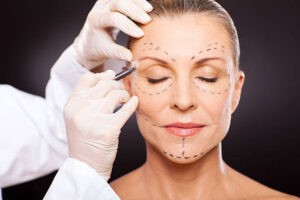Eye Lift/Blepharoplasty
Because our face reveals our inner confidence and self-image
- Home
- Facial Plastic Surgery
- Eye Lift Blepharoplasty
Eye Lift/Blepharoplasty
Cosmetic eyelid surgery, technically known as blepharoplasty, is one of the most popular cosmetic procedures. In fact, it’s so popular that it is estimated that more than one hundred thousand people undergo blepharoplasty every year.
Blepharoplasty usually involves removal of excess fat or skin from upper and lower eyelids, thus restoring a refreshed look and giving the eyes a more plump and youthful appearance.
Specifically, blepharoplasty or eyelid surgery can help treat the following:
- Excess fat deposit under the eyes, that makes eyes appear puffy
- Sagging or drooping skin that deforms the natural shape of the eyelids
- Wrinkles and fine lines under the eyes
- Bags under the eyes
The simple procedure usually takes around one hour, and is performed with local anesthesia with sedation. Small incisions are made in and around the upper and lower eyelids – to minimize visibility, incisions are always made around natural skin creases and folds. Once the incisions are in place, excess fat and skin are trimmed away, and fine sutures are used to close the gaps. In “transconjunctival” eyelid surgery, which deals exclusively with the removal of excess fat, no sutures are used.
After the procedure, no bandages are applied, and sutures, when they are used, are usually removed within four days. It’s observed that most blepharoplasty patients are up and about in one or two days of the procedure.
Latest Technique: At Cocoona, Dubai we specialize in fat preserving techniques for the lower eyelid surgery. Our technique remodels and replaces herniated fat to restore youthful appearance and reverse signs of aging, quickly and efficiently.
Quick Facts
Procedure Type
Surgical
Anesthesia
Local Anesthesia with or without sedation
Duration
30 min each bilateral upper and low eye lid
Recovery Period
1 weeks
FAQ
FAQ's for Eye Lift/Blepharoplasty
Blepharoplasty is a specialized surgical procedure that removes excess skin or fat from the eyelids to improve the look of hooded eyes, droopy eyelids or eye bags. It can be performed on either the upper or lower eyelids, or on both.
For Upper Blepharoplasty, an incision is made along the upper eyelid crease to minimize any visible scarring. Excess skin, fat and muscle is then removed prior to the incision being closed up with very fine stitches. For Lower Blepharoplasty, the incision is made just below the lower lashes or on the inside of the eyelid. Excess fat is then removed from the undereye area (‘eye bags’) prior to being sutured.
Blepharoplasty can be performed under local anaesthetic injected into the eyelids or under general anaesthetic. Your surgeon will be able to advise as to which technique will be the most appropriate in your case.
The results of Blepharoplasty surgery are long lasting. To ensure that the results look good for as long as possible, you should lead a healthy lifestyle and enjoy a healthy diet, avoid smoking, follow a good skincare routine and avoid excessive exposure to the sun.
As with any surgical procedure that can significantly change the way you look, Blepharoplasty surgery can have a psychological impact and so careful thought needs to be given prior to going ahead. At Cocoona, we ask for you to conduct a self-evaluation to help you assess if you are one hundred per cent ready, both physically and mentally, for surgery. You should ask yourself the following questions:
- Do I have realistic expectations about what a Blepharoplasty can achieve?
- Do I know how I want to look after surgery?
- Do I fully understand the surgical procedure, how long it will take and what I need to do after the surgery to promote healing and recovery?
- Am I prepared to follow a healthy lifestyle to help maintain the results?
Once you have clarity on the above, the next step is to find the right surgeon and clinic. These are of paramount importance.
You need a surgeon who is experienced in performing Blepharoplasty surgery, has a sound reputation and proven results. You should also look for a surgeon who will give you honest and realistic advice on what you can and can’t achieve with this procedure.
A good clinic is one that has an experienced and highly skilled surgical team, licensed aestheticist(s), well trained nursing staff, an excellent reputation, and a low complication rate. Of course, the clinic also needs to be licensed with the relevant authorities for the country or region it is situated in. At Cocoona, we tick all these boxes.
For an accurate cost assessment, you will need to book an initial consultation with our surgeon. As with almost any aesthetic procedure, the cost will depend on the following factors:
Surgeon’s Expertise – The surgeon’s fee is based on their experience. Obviously, a reputable surgeon who is established and has a successful track record will charge higher fees.
Clinic/ Hospital – Fees also depend upon the quality of the facility chosen for the operation.
Geographic Area – Depending on the city/ area you decide to have the surgery in, the cost is likely be different: clinics in larger metropolitan cities tend to cost more. You should bear in mind that the expertise of your consultant and your comfort factor with him or her should be one the most important considerations, much more so than the cost of the procedure. A cheap procedure could turn out to be an expensive proposition in the long run.
Once you are clear about your reasons for Neck Lift surgery and have decided to proceed, call us to fix an appointment. On the appointed day, the expert surgeon who will perform the surgery will consult with you. During the consultation, you should expect the following:
- Discussion about why you have opted and what your goals are in relation to the procedure
- Understanding your medical history
- Evaluating your health status
- The options available for your surgery
- An examination of the area to be treated, measurements (if relevant) and potentially, photography to record what the area looks like prior to the procedure being undertaken
- Explanation of the options, steps involved, future treatment, risks, and potential complications, if any
Feeling apprehensive before the surgery takes place is entirely normal. Be sure to discuss any fears or concerns you have with your surgeon and don’t hesitate to ask any questions related to the results you hope to achieve.
Being well informed is being well prepared. Apart from checking that your clinic and doctors have the necessary skills, knowledge and experience, here are some more areas that you should explore:
- How many years of experience do you have as a Plastic Surgeon?
- How many Blepharoplasty surgeries have you done?
- Where will the surgery be conducted?
- Is the clinic prepared and certified to undertake Blepharoplasty surgery?
- What are the most common complications experienced by your patients? And how were they handled?
- Do you have a “before” and “after” photo album of similar surgeries?
- Am I a good candidate for Blepharoplasty surgery?
- What can I expect after Blepharoplasty surgery?
- What precautions would I need to take before and after the surgery?
- How many days will I take to recover fully?
- What should I do for a quick recovery?
- Will the shape and appearance of the area to be treated change over time? If yes, how?
- What are the risks involved in this surgery?
- What treatment option/ technique will be used for me?
Please feel free to add any more questions that you wish to this list before your consultation.
After your initial consultation, you will need to make the final decision regarding your surgeon. Never choose your surgeon simply based on how much the treatment will cost. Instead, focus on the following:
License & certification – is the surgeon licensed and certified to conduct Blepharoplasty surgery by a reputable body?
Expertise & experience – the number of years of experience/ how many Blepharoplasty surgeries the surgeon has performed previously
Before/ after pictures – evidencing their capability of past performance
Clarity on possible results – whether they are providing you with realistic expectations and honest feedback
Professionalism & comfort factor – if you feel comfortable with the professionalism and manners of a surgeon, and feel you can trust him/her with your face and body then that’s the surgeon you should consider
Safety philosophy – if the surgeon is ready to put you at risk by recommending or agreeing to perform multiple unrelated surgeries and/or procedures on the same day or within a short period of time, you should refuse to proceed and go elsewhere.
Patient testimonials & reviews – A good reputation and a large number of positive patient testimonials and reviews on independent forums should be an important consideration in your process of choosing the right surgeon
Keep in mind that there are hidden costs in the long term and greater risks (including threat to life), associated with a surgery where costs, safety and skills are compromised. Always be wary of a plastic surgeon or clinic that is offering very low costs and/ or miraculous results.
After your initial consultation with the surgeon, once you are satisfied with the outcome of the ensuing discussions and have confirmed that you will go ahead with your chosen consultant, a date will be fixed for the procedure.
Blepharoplasty surgery can be performed on an outpatient basis for most patients. In the unlikely event of complications, an overnight stay may be required for outpatients, or inpatients may face a longer stay, should the attending doctor make the recommendation. Before you come in for your procedure, we recommend that you plan accordingly.
Here are some of the important steps that you must take before the procedure:
- Discuss all medication and vitamins that you regularly use with your consultant to see if you should stop taking them before surgery and, if so, for how long. For example, any medications and vitamins that interfere with your body’s blood clotting ability, such as Vitamin E, will need to be stopped completely prior to surgery.
- Smokers should quit at least two months prior to surgery; smoking interferes with the efficiency of blood flow to the skin which may have an impact on achieving optimal results and increase the risk of complications.
- You should be in the best possible health and at a stable weight; ensuring that you follow a healthy, balanced diet prior to surgery will help you to be in optimal physical condition to help promote the best outcome
Our surgeon and patient counselor will guide you thoroughly about what you need to do so that you are completely at ease and ready for surgery and beyond.
- You should expect some discomfort and pain after the surgery. This will be controlled with a pain management plan, which will be explained to you by your surgeon.
- Initially post-surgery you will have black eyes – the bruising and swelling will last for up to two weeks
- Around 5-7 days after the procedure, the sutures will need to be removed. You will be able to wear makeup from this point.
- You will not be able to drive for up to a week after the procedure, and contact lenses can’t be worn for around two weeks.
What Are You Waiting For...
Make an appointment
Ready to transform your look? Make an appointment today by calling us or booking online for expert consultation and care.
Our location
4th Floor, 10P, Golf Crse Rd, Sector 28, Chakkarpur, Gurugram, Haryana 122009
Opening Hours
Mon-Sat: 11am-09pm
Sun – Closed
Contact
Phone: +91 9910223460
Email: hello@cocoona.in



